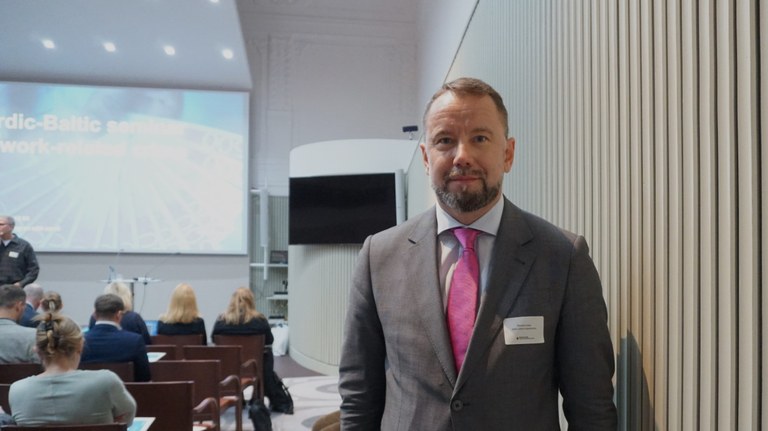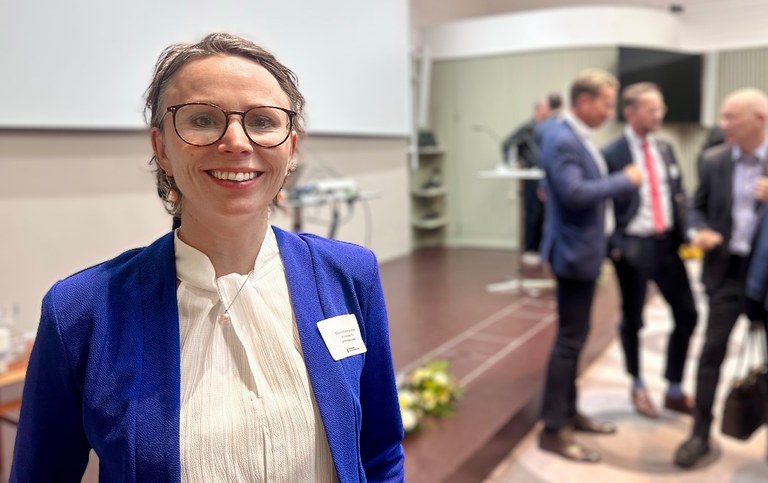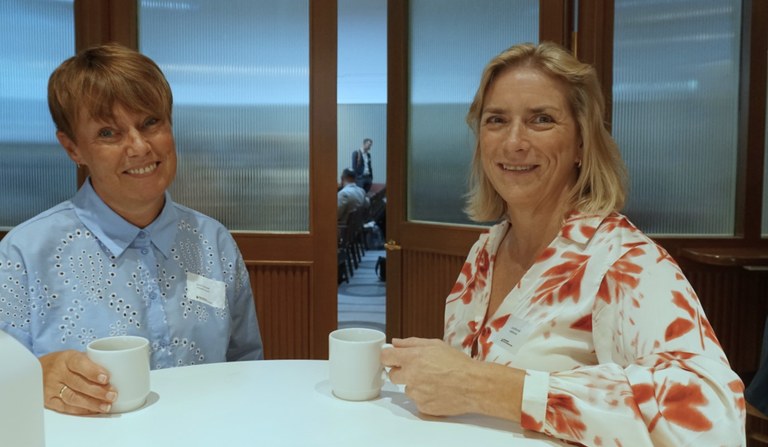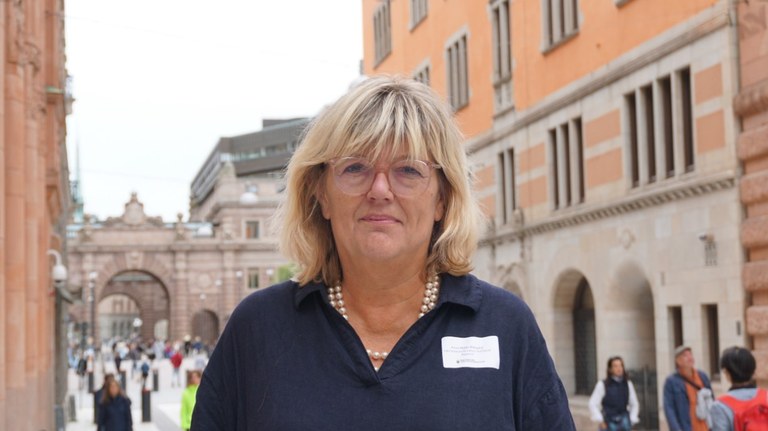Tight Nordic-Baltic cooperation against work-related crime
Work-related crime is a growing problem that requires cross-border collaboration between state authorities and countries. For several years, a Nordic-Baltic collaboration on work-related crime has been in place. In January 2025, it will be formalised on the initiative of the Nordic Council of Ministers.
Even before the conference “Nordic-Baltic Seminar on Work-Related Crime” has begun, the sound levels are high and the lobby is filling up with Nordic and Baltic colleagues greeting each other warmly. They are representatives from different authorities in their respective countries who fight work-related crime on a daily basis.
Many have also worked together in recent years to find ways of reducing cross-border crime. The focus is on communicating successful practices and shaping joint measures and collaborations. The exchange of knowledge and information is also on the agenda.

Renars Lusis, Director of the State Labour Inspectorate in Latvia.
“We have different skills and experiences from our work against work-related crime, so the collaboration and knowledge exchange between the Nordic and Baltic countries run both ways,” says Renars Lusis, Director of the State Labour Inspectorate in Latvia.
"We have also developed an informal network, so if I want to hear how one country has solved a problem I can simply call one of my Baltic or Nordic colleagues."
The conference is held in Stockholm on a Thursday in September and is hosted by the Swedish government under the Swedish Presidency of the Nordic Council of Ministers.
For several years there has been informal Nordic-Baltic cooperation on workplace crime, but from January 2025 the cooperation will be formalized following an initiative by Sweden that was decided during a labour market ministerial meeting in Iceland in November.
“It is crucial to fight crime, fraud and abuse linked to the labour market. Work-related crime means workers risk being exploited in various ways, which increases insecurity in working life. To stop these types of crime it is important to cooperate across borders,” said Minister for Employment Paulina Brandberg as she opened the Stockholm conference.
Many kinds of work-related crime
The Swedish delegation against work-related crime has defined work-related crime as “qualified practices that violate provisions in laws and agreements related to working life”. These involve deliberate and/or organised violations of existing laws and regulations where workers are exploited, competition with other companies is distorted or the public sector is affected.
It is difficult to estimate exactly how extensive work-related crime is, but according to the Swedish delegation against work-related crime, it is a serious problem. For instance, they estimate that undeclared wages linked to work-related crime in 2021 amounted to 81 – 91 billion kronor (€7m – €8m) in Sweden alone.
Dependency creates fear and poor self-control
Work-related crime also has major effects on working environments. The Swedish Agency for Work Environment Expertise, Mynak, presented to the conference a new survey of Nordic countries’ experiences of the effect that work-related crime has on working environments.
The results show that where work-related crime occurs, workers are exploited in various ways regardless of gender and industry, and that the working environment suffers.

Monica Kaltenbrunner, process-oriented analyst at the Swedish Agency for Work Environment Expertise Mynak. Photo: Mynak.
Monica Kaltenbrunner from Mynak conducted the survey and describes a world of workers who are afraid to complain because they think they might lose their jobs, and workers who earn far less than the wages agreed in collective agreements and who sometimes are paid late or not at all.
Many of the workers who were sent by their employers from their home countries arrive in countries where they do not understand the language. It is also not unusual that workers have signed contracts that they do not understand. They might believe they have a formal employment contract, when in fact they do not.
The survey also exposed problems with the physical working environment. For instance, in sectors such as agriculture and cleaning, workers face high temperatures and few opportunities for ventilation or time to recover. Others describe disturbing odours, poor lighting and dust. Safety is another problem.
This could be down to the fact that posted workers have a different approach to safety – “I am a man and will not be wearing a helmet”. They might not understand existing safety regulations or may be asked to cover the cost of safety equipment themselves. Workers who come from other countries than the host country often work harder than domestic workers and get paid less.
Several workers also describe working environments where workers are treated differently based on appearances, origin or migration status.
“In all of the surveyed industries we met workers facing high demands and little control. That is not good at all,” said Monica Kaltenbrunner during her presentation.
Nordic trust being challenged
Cecilie Myrvold och Anne Kristine Holstad are both facing the reality described by Monica Kaltenbrunner in her report “How Work-Related Crime Impacts Workers’ Working Environments”. They have been inspectors with the Norwegian Labour Inspection Authority since 2017.

Cecilie Myrvold and Anne Kristine Holstad, both inspectors with the Norwegian Labour Inspection Authority.
They explain how they might arrive to inspect a company and workers run away because they lack the relevant paperwork. Or they meet workers who have signed working hour agreements that mean they do not get paid overtime. When an employee has signed something like that, there is little the inspectors can do.
“We cannot lie down and cry. Instead have to use the measures that are available to us and escalate further up the organisation the things we cannot address,” says Anne Kristine Holstad.
Both inspectors wish they had more tools at hand when they meet workers who have fallen victim to work-related crime.
“I wish there were stricter requirements for employers to register workers so that everyone must be registered in national databases before they start working here," says Cecilie Myrvold.
When they face companies that are part of organised crime, they collaborate with the police and other relevant partners. The inspectors are never alone in the field and are always operate at least in pairs.
“What separates organised crime from smaller fraudsters is that they have a lot of money. Their legal papers are often in order and if we say a new ventilation system is needed they can afford to invest a million kronor to do it,” says Cecilie Myrvold.
Anne Kristine Holstad considers how one of the main pillars of Norway’s labour market is being challenged when people from many different countries and companies become a part of that labour market.
“The Norwegian model is built on tripartite cooperation and it is based on trust, voluntary action and consensus. We have built our system around this way of thinking. When we then face cultures that are not built on trust, they do not understand our conditions or way of reasoning.”
Both believe there has been an increased and welcome awareness of work-related crime, which includes an understanding that is not a “quick fix”.
Increased cooperation between countries and their authorities
The idea that the fight against work-related crime is not a "quick fix” is also confirmed when all the countries that have participated so far in the cooperation share their experiences and explain how they are working to combat the issue.
There are many measures in place, including increasingly developed cooperation between authorities such as the police, tax agencies, labour inspectors, and local and regional stakeholders. Several countries, including Norway and Sweden, have also established regional centres focused on work-related crime.
The Nordic-Baltic cooperation has also seen countries carry out joint inspections, a project that has been studied by the Norwegian Fafo Research Foundation.

Anne Mette Ødergård, senior researcher at Fafo and head of the project Fafo Østforum, which collects news on labour immigration and organises seminars.
“You have to cooperate across borders to keep a tab on posted workers. Today, labour moves easily between countries and national authorities cannot keep up. National labour inspection authorities cannot manage this in isolation and this is not only about working environments but also the right to security and taxes,” says Anne Mette Ødegård at Fafo.
It is not clear exactly how many EU citizens are sent to work in a different country, but in 2022 there were approximately 1.8 million. On top of that, some are sent from non-EU countries, and they are often even more vulnerable.
“In Norway, organised crime is increasingly infiltrating the labour market. During labour shortages, third-country citizens become more attractive and it has been said this labour is as profitable as the drug trade. That’s why countries must face the challenges together, exchange experiences and formulate requirements,” says Anne Mette Ødegård.
- Paulina Brandberg
-
opens the Baltic-Nordic seminar on labour crime. She is Minister for Gender Equality and Working Life in Swweden and has a background as a prosecutor. Photo: Mynak.
 Follow us on Facebook
Follow us on Facebook
